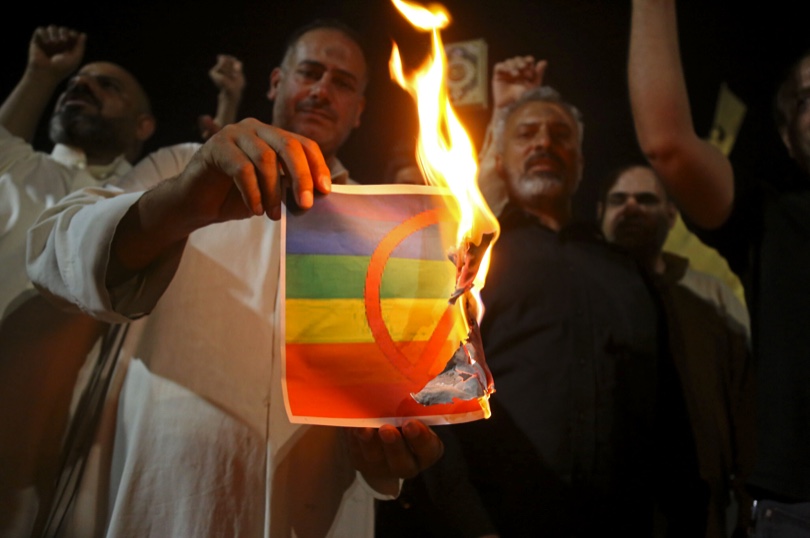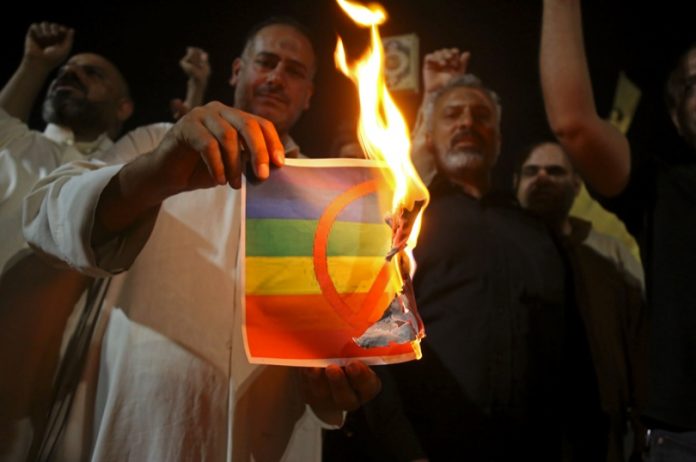กฎหมายใหม่ของอิรักขยายบทลงโทษสำหรับความสัมพันธ์ระหว่างเพศเดียวกันเป็นจำคุก 15 ปี โดยกลุ่มสิทธิมนุษยชนประณามว่าเป็นการทำลายสิทธิของ LGBTQ รัฐสภาแก้ไขกฎหมายต่อต้านการค้าประเวณีเมื่อปี 2531 โดยกำหนดโทษจำคุกสูงสุด 7 ปี เช่น การส่งเสริมการรักร่วมเพศ บุคคลข้ามเพศและแพทย์ที่ทำการผ่าตัดแปลงเพศมีโทษจำคุกสูงสุด 3 ปี ยกเว้นคดีรักษาความพิการแต่กำเนิดตามคำสั่งศาล Raad al-Maliki สมาชิกสภานิติบัญญัติอิสระชาวอิรักเรียกร้องบทลงโทษที่รุนแรงยิ่งขึ้น โดยเสนอให้จำคุกตลอดชีวิตและประหารชีวิตสำหรับความสัมพันธ์ระหว่างเพศเดียวกัน อย่างไรก็ตาม สมาชิกสภานิติบัญญัติที่เข้าร่วมส่วนใหญ่สนับสนุนการนำร่างกฎหมายดังกล่าวมาใช้ด้วยการลดโทษจำคุก โดยมีเป้าหมายเพื่อ “รักษาโครงสร้างทางศีลธรรม” ของสังคม
Samar ซึ่งเป็นสมาชิกของชุมชน LGBTQ ในกรุงแบกแดด ประณามกฎหมายดังกล่าวว่า “ไม่ยุติธรรม” และบ่งชี้ถึงความหวาดกลัวกลุ่มรักร่วมเพศที่เพิ่มขึ้นในอิรัก Samarให้สัมภาษณ์กับ CNN โดยไม่เปิดเผยตัวตนด้วยเหตุผลด้านความปลอดภัย โดยเล่าถึงการเลือกปฏิบัติและความรุนแรงที่เพื่อนของเธอต้องเผชิญเนื่องจากรสนิยมทางเพศของพวกเขา เธอเล่าเรื่องราวที่น่าเศร้าของเพื่อนเลสเบี้ยนจากอัล-ดิวาเนียห์ที่ถูกครอบครัวของเธอวางยาพิษ ปัจจุบัน LGBTQ จำนวนมาก รวมถึง Samar รู้สึกถูกบังคับให้ออกจากอิรัก แม้จะทำธุรกิจของตัวเอง แต่ Samar ก็ยังเก็บเงินเพื่อหลบหนี โดยเต็มใจเสี่ยงต่อการอพยพย้ายถิ่นอย่างผิดกฎหมายแทนที่จะอยู่ต่อ Samarแนะนำว่าช่วงเวลาของร่างกฎหมายดังกล่าวเป็นไปในเชิงกลยุทธ์ ซึ่งสอดคล้องกับการประชุมระหว่างผู้นำอิรักและสหรัฐฯ เมื่อเร็วๆ นี้ โดยเรียกร้องให้ทั่วโลกเข้ามาแทรกแซง
แมทธิว มิลเลอร์ โฆษกกระทรวงการต่างประเทศสหรัฐฯ แสดงความกังวลอย่างมากต่อกฎหมายใหม่นี้ โดยเตือนว่ากฎหมายดังกล่าวอาจจำกัดเสรีภาพในการพูดอย่างร้ายแรง ขัดขวางกิจกรรมของ NGO และลดคำอุทธรณ์ของอิรักต่อนักลงทุนต่างชาติโดยบ่อนทำลายสิทธิมนุษยชนและความหลากหลายทางเศรษฐกิจ เขาเตือนว่าพันธมิตรธุรกิจระหว่างประเทศได้ส่งสัญญาณถึงผลกระทบด้านลบที่อาจเกิดขึ้นต่อการเติบโตทางเศรษฐกิจของอิรักแล้วอันเนื่องมาจากแนวทางปฏิบัติที่เลือกปฏิบัติดังกล่าว Sarah Sanbar นักวิจัยของ Human Rights Watch ซึ่งมุ่งเน้นที่อิรัก อธิบายว่ากฎหมายดังกล่าวเป็น “การพัฒนาที่น่าสยดสยองและการโจมตีสิทธิมนุษยชน” โดยวิพากษ์วิจารณ์การจัดลำดับความสำคัญของอิรักในการจัดลำดับความสำคัญของการเลือกปฏิบัติต่อบุคคล LGBTQ ผ่านการตรากฎหมายที่เป็นประโยชน์ต่อพลเมืองของตน เช่น ความรุนแรงในครอบครัว หรือ กฎหมายคุ้มครองเด็ก
Iraq’s LGBTQ crackdown imposes sentences of up to 15 years in prison for same-sex couples.

Iraq’s new law extends penalties for same-sex relations to 15 years in prison, condemned by rights groups as a blow to LGBTQ rights. Parliament amended a 1988 anti-prostitution law, criminalising acts like “promoting homosexuality” with up to seven years’ imprisonment. Transgender individuals and doctors performing gender reassignment surgery face up to three years’ jail time, except for cases treating birth defects under court order. Originally seeking harsher penalties, independent Iraqi lawmaker Raad al-Maliki proposed life imprisonment and death for same-sex relations. However, the majority of attending lawmakers favoured the bill’s adoption with reduced sentences, aiming to “preserve the moral fabric” of society.
Samar, a member of Baghdad’s LGBTQ community, condemned the legislation as “unfair” and indicative of growing homophobia in Iraq. Speaking anonymously to CNN for safety reasons, Samar recounted the discrimination and violence her friends faced due to their sexual orientation. She shared the tragic story of a lesbian friend from Al-Diwaniah who was poisoned by her family. Many LGBTQ individuals, including Samar, now feel compelled to leave Iraq. Despite running her own business, Samar is saving money to flee, willing to risk illegal migration rather than stay. Samar suggested the bill’s timing was strategic, aligning with a recent meeting between Iraqi and US leaders, urging global intervention.
Matthew Miller, a spokesperson for the US Department of State, expressed grave concern over the new legislation, warning that it could severely curtail free speech, hinder NGO activities, and diminish Iraq’s appeal to foreign investors by undermining human rights and economic diversity. He cautioned that international business coalitions had already signalled potential negative impacts on Iraq’s economic growth due to such discriminatory practices. Sarah Sanbar, a researcher for Human Rights Watch focusing on Iraq, described the law as “a horrific development and an attack on human rights,” criticising Iraq’s prioritisation of codifying discrimination against LGBTQ individuals over enacting laws benefiting its citizens, such as domestic violence or child protection laws.
By CNN NEWS

















